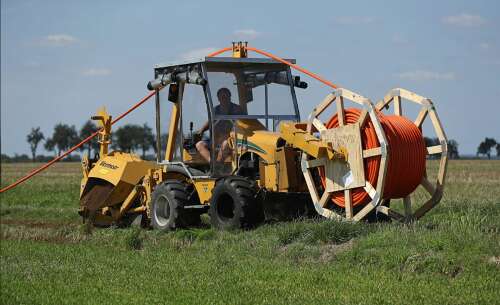A worker lays pipes used to run an underground fiber optic cable during the installation of broadband infrastructure in rural Germany. (Sean Gallup/Getty Images)
New Mexico’s director of broadband says hundreds of millions in federal funding could be at stake
Data errors and an inability to keep up with the demands of the federal program could result in the state losing hundreds of millions of dollars that would expand broadband to underprivileged areas of New Mexico.
Kelly Schlegel is the state director of broadband. I spoke to the Legislative Science, Technology and Communications Committee on Thursday about staffing problems that could prevent the full expansion of the Internet.
New Mexico is participating in a nationwide high-speed Internet effort to bring broadband to areas that do not have or lack fast, reliable Internet entirely. The National Telecommunications and Information Administration distributes funding so that countries can establish or expand broadband access in those underserved or underserved locations.
Many of New Mexico’s neediest areas are rural communities, and some say they’ve been ignored for too long.
But the state is struggling to keep up with the program’s proposed schedules. Schlegel said the broadband department needs more staff to sort out the problems to ensure the state gets the money it needs to fully expand the internet.
Officials need to know the state’s Internet accessibility
New Mexico broadband officials need to submit information about which areas in New Mexico have internet access to the FCC by January 13 to get the best funding. This will update the draft national map released by the FCC on Friday, November 18th and will determine how much money New Mexico gets.
But Schlegel said the Broadband Division has found a number of errors in the FCC’s map of New Mexico detailing broadband access. She said the department, right now, probably doesn’t have enough staff to fix it by the program’s mid-January target date.
“It’s very important to get the maps right, and our maps aren’t really there yet,” she said.
Department spokesman Charlie Mesh Jr. acknowledged that the office and Schlegel as director are fairly new, and said the agency is still trying to support them. “We are there to try to address these issues and make sure they have the information and resources that they need,” he said.
But Schlegel said the federal agency announced the January date abruptly, and didn’t tell New Mexico until two months later in order to change the information—even though the state had previously asked when the FCC needed the map information—which sent the team scrambling to piece their data together. .
The January date isn’t actually a hard deadline, Mish said, but rather the best time for states to submit internet information. However, he said the agency wants to get the program moving quickly. He said, “Any day that passes where no one has access to it, there is a cost.”
Schlegel said she believes the state’s mapping issues could cause New Mexico to lose hundreds of millions of dollars. This could leave thousands of people in the dark without access to the internet.
Mish declined to comment on whether filing after the January date could cause New Mexico to lose money.
In total, Schlegel said New Mexico hopes to get at least $700 million. The minimum that states can receive is $100 million. With this money, New Mexico can allocate grants to carriers to prepare and expand broadband.
But she said, “Right now, I’m worried we may have a few hundred million dollars.”
She said the broadband department was essentially waving a red flag at lawmakers on Thursday.
“We don’t want New Mexico to lose a single dollar,” she said.
Lawmakers were receptive to the news. Many have expressed concern and potential solutions, such as who can help with map issues. That vital data can’t be incorrect, causing the state to lose that much funding, said Sen. Michael Padilla (D-Albuquerque), the committee chairman.
“This is a big deal,” Padilla said. “We can let this happen.”
Originally posted 2022-11-22 10:16:21.
